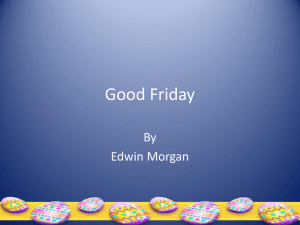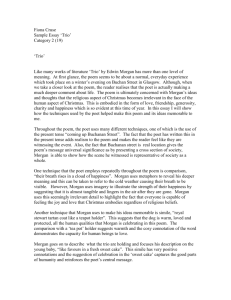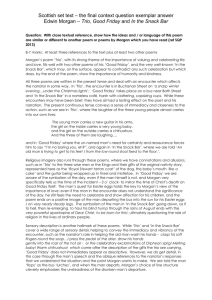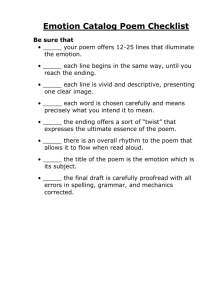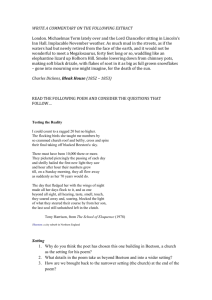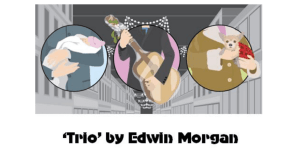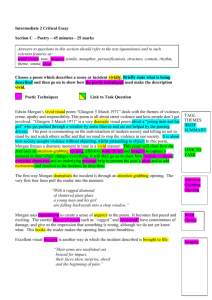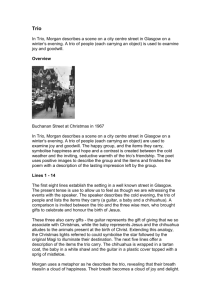Edwin Morgan – Trio – Support Notes
advertisement
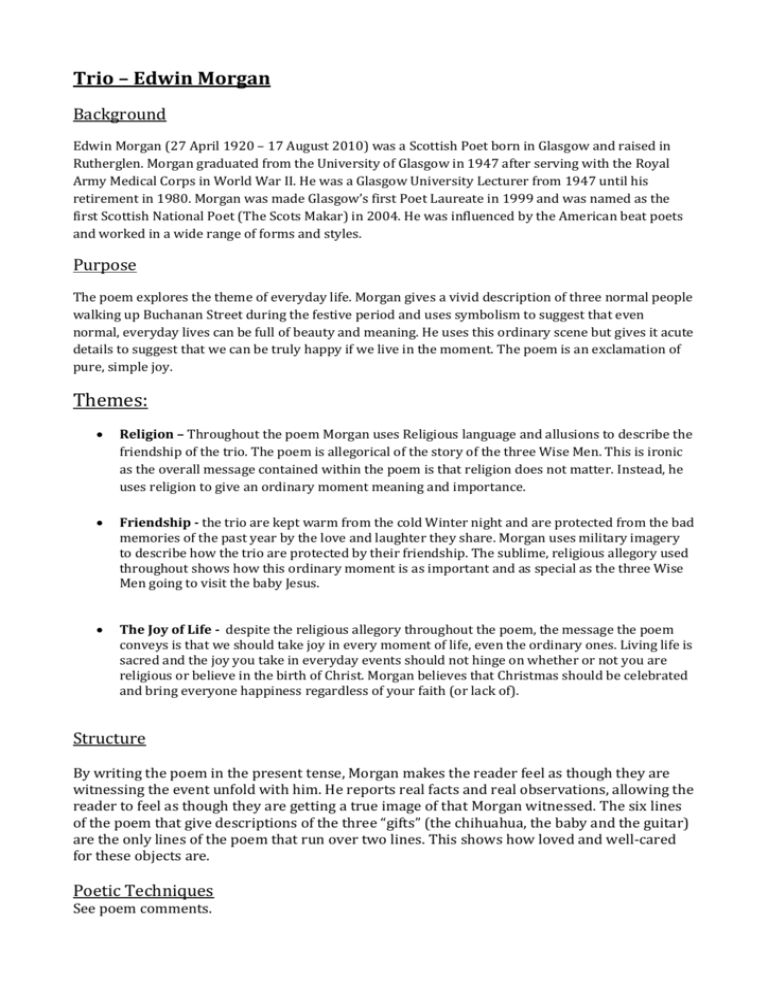
Trio – Edwin Morgan Background Edwin Morgan (27 April 1920 – 17 August 2010) was a Scottish Poet born in Glasgow and raised in Rutherglen. Morgan graduated from the University of Glasgow in 1947 after serving with the Royal Army Medical Corps in World War II. He was a Glasgow University Lecturer from 1947 until his retirement in 1980. Morgan was made Glasgow’s first Poet Laureate in 1999 and was named as the first Scottish National Poet (The Scots Makar) in 2004. He was influenced by the American beat poets and worked in a wide range of forms and styles. Purpose The poem explores the theme of everyday life. Morgan gives a vivid description of three normal people walking up Buchanan Street during the festive period and uses symbolism to suggest that even normal, everyday lives can be full of beauty and meaning. He uses this ordinary scene but gives it acute details to suggest that we can be truly happy if we live in the moment. The poem is an exclamation of pure, simple joy. Themes: Religion – Throughout the poem Morgan uses Religious language and allusions to describe the friendship of the trio. The poem is allegorical of the story of the three Wise Men. This is ironic as the overall message contained within the poem is that religion does not matter. Instead, he uses religion to give an ordinary moment meaning and importance. Friendship - the trio are kept warm from the cold Winter night and are protected from the bad memories of the past year by the love and laughter they share. Morgan uses military imagery to describe how the trio are protected by their friendship. The sublime, religious allegory used throughout shows how this ordinary moment is as important and as special as the three Wise Men going to visit the baby Jesus. The Joy of Life - despite the religious allegory throughout the poem, the message the poem conveys is that we should take joy in every moment of life, even the ordinary ones. Living life is sacred and the joy you take in everyday events should not hinge on whether or not you are religious or believe in the birth of Christ. Morgan believes that Christmas should be celebrated and bring everyone happiness regardless of your faith (or lack of). Structure By writing the poem in the present tense, Morgan makes the reader feel as though they are witnessing the event unfold with him. He reports real facts and real observations, allowing the reader to feel as though they are getting a true image of that Morgan witnessed. The six lines of the poem that give descriptions of the three “gifts” (the chihuahua, the baby and the guitar) are the only lines of the poem that run over two lines. This shows how loved and well-cared for these objects are. Poetic Techniques See poem comments. Trio Coming up Buchanan Street, quickly, on a sharp winter evening a young man and two girls, under the Christmas lights - The young man carries a new guitar in his arms, the girl on the inside carries a very young baby, and the girl on the outside carries a chihuahua. And the three of them are laughing, their breath rises in a cloud of happiness, and as they pass the boy says, "Wait till he sees this but!" The chihuahua has a tiny Royal Stewart tartan coat like a teapot- holder, the baby in its white shawl is all bright eyes and mouth like favours in a fresh sweet cake, the guitar swells out under its milky plastic cover, tied at the neck with silver tinsel tape and a brisk sprig of mistletoe. Orphean sprig! Melting baby! Warm chihuahua! The vale of tears is powerless before you. Whether Christ is born, or is not born, you put paid to fate, it abdicates under the Christmas lights. Monsters of the year go blank, are scattered back, can't bear this march of three. - And the three have passed, vanished in the crowd (yet not vanished, for in their arms they wind the life of men and beasts, and music, laughter ringing them round like a guard) at the end of this winter's day.


